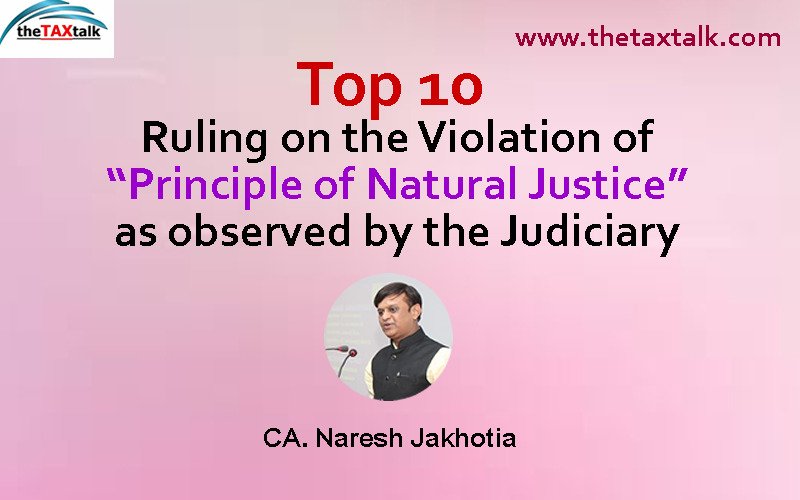![]()
Top 10 Ruling on the Violation of “Principle of Natural Justice” as observed by the Judiciary
There are various cases where the assessment proceeding is quashed or restored by the judiciary for the Violation of “Principle of Natural Justice”. It has happened mostly in the case of faceless assessment scheme wherein the order are passed by the authorities without following the due procedure of law as provided in the scheme or as provided by judiciary.
It may be noted that there have been several instances in which assessees have been complaining about the assessment order being passed without even considering the taxpayers request for an adjournment or without cancelling the request or without considering/ignoring an assessee’s submission.
There are instances wherein the assessment orders have been issued within 2-3 days of issuance of show-cause notices thereby resulting in not giving enough opportunity and time of being heard to the assessee.
Even in some cases, the assessment has been finalized without the assessee being able to submit any response or compile the required information.
This has resulted in numerous writ petitions which have been filed with the jurisdictional High Courts on this matter. In various cases, the Hon’ble High Courts have stayed the demand and allowed assessees to make submissions.
In fact, in many cases, the Hon’ble High Courts have even ruled that the assessment has been concluded contrary to the “principle of natural justice” and hence the order was quashed, set aside or stayed.
Here are the instances which has been heard or decided by the courts following the principle of Natural Justice:
-
The Hon’ble Bombay High Court in the case of Praful M Shah (W.P. (L) NO. 11143 OF 2021) stayed the assessment order, where the same was passed in “stark violation of principles of natural justice” as the assessee was not heard at all with respect to the new additions. The assessee also contended that “there are a lot of glitches on operation of faceless assessment scheme”. The matter is still pending before the High Court.
-
In a landmark case before the Hon’ble Delhi HC in the case of Blue Square Infrastructure LLP (W.P.(C) 5418/2021), the court has set aside the assessment order as the same was passed without considering the request for adjournment and without waiting for the expiry of the time limit given under the show cause notice.
-
The Hon’ble Delhi HC in the case of KBB Nuts Private Limited (W.P.(C) 5234/2021) has set aside the assessment order as the same was concluded without considering the assessee’s request for adjournment and assessee’s response to the show case notice. In this case, the HC rejected the assessment without getting into the merits of the objection and direct the assessing officer to pass a fresh assessment after considering the assessee’s response and granting a personal hearing.
-
Hon’ble Delhi High Court in the case of Sanjay Aggarwal vs. NFAC [W.P.(C) 5741/2021; order dated 02.06.2021] has held that Section 144B(7)(vii) grants liberty to the assessee to seek a personal hearing in the matter where there is variation of income. It is incumbent upon the revenue to accord a personal hearing to the Assessee.
-
Similarly, the Hon’ble Bombay High Court in the case of Raja Builders (W.P. (L) NO. 11224 OF 2021) stayed the assessment order and penalty notice as the same was passed without considering assessee’ s detailed response to the show cause notice (SCN) and request for a personal hearing. The assessee also contended that the SCN dated 20th April appeared on the portal for the first time only on 22nd.
-
The Hon’ble Delhi HC in the case of Renew Power Private Limited (W.P. (C) 5235/2021) quashed the faceless assessment order. The Hon’ble Delhi High Court referred to the Hon’ble Supreme Court decision in the case of Calcutta Discount Co Ltd vs ITO (AIR 1961 SC 372) and Whirlpool Corpn. vs. Registrar of Trademarks (Civil Appeal No. 5201 of 1998) and held that “the denial of opportunity to the petitioner to place before the assessing officer, its objections and/or explanations by way of a response has led to breach of principle of natural justice, resulting in grave civil consequences for the petitioner”. Thus, the Hon’ble High Court concluded that the impugned assessment order which was passed before the expiry of time accorded to the assessee to file response was not in accordance with the law.
-
The Hon’ble Madras High Court in the case of M/s Magick Wood Exports Private Limited(W.P. No. 10693 of 2021) set aside the assessment order as the same was passed in violation of the “principle of natural justice” since the assessee’s request for adjournment was neither rejected nor considered before concluding the assessment. Accordingly, the HC directed the revenue to enable the portal for the assessee to submit a response and conclude assessment after considering assessee’s response to the objections to the draft assessment order.
-
The Hon’ble Bombay HC in the case of Shelf Drilling Offshore Services (W.P. (L) NO. 10949 OF 2021) set aside the assessment order and stated that there were a lot of glitches in the faceless assessment scheme and accordingly, the assessment was kept in abeyance for the time being.
-
The Hon’ble Delhi High Court in the case of M/s DJ Surfactants(W.P. No. 4814/2021) granted interim stay on the assessment order passed on the premise that it was concluded prima facie in violation of ‘principles of natural justice’.
-
Bombay High court in the case of Piramal Enterprises Limited Vs ACIT has made the following remarkable observation


